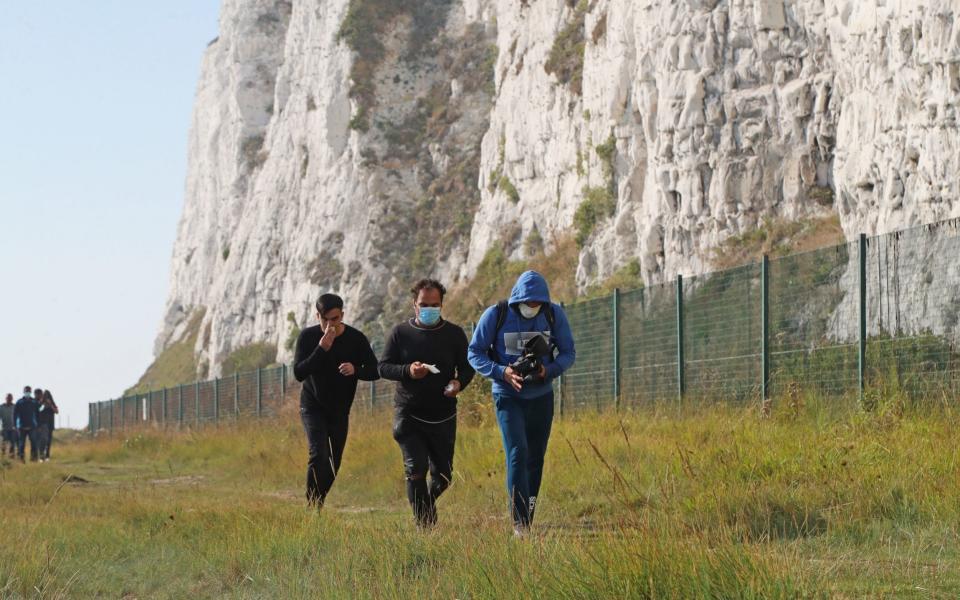Army barracks to become UK’s first ‘migrant camp’ following surge in Channel crossings, despite complaints from MPs

An army barracks will be transformed into the UK’s first “migrant camp” following a surge in Channel crossings, as the local council complains it was not consulted on the plans.
Around 400 people who are having their asylum claims processed will be moved to Napier Barracks in Folkestone from next week, with the Home Office looking at using other MoD sites around the country to house more people.
The move has angered local officials, who say that they "cannot support" the decision and have “great concerns” about the impact on the local community.
In a joint letter to Home Secretary Priti Patel, Conservative MP Damian Collins along with the leader of Folkestone and Hythe District Council and the chairman of Sandgate Parish Council demanded that the decision be reversed.
"We have great concerns about the impact this large open camp will have on the welfare of the local residential community and also those people in the asylum system who will be placed at the barracks itself," they said.

In a statement, Folkestone and Hythe District Council cited a "lack of consultation on this matter and the exceptionally poor communication with us".
They added: "We are quite sure that members of the community will have many questions, and we are seeking clarification as a matter of urgency."
So far this year, more than 6,200 people have crossed the English Channel in small boats and reached the UK. Many of them have been housed in hotels for months, costing the government millions of pounds.
Home Office sources told the Telegraph: “This move will save the taxpayer millions whilst ensuring vulnerable people have somewhere secure to stay until their claim is decided.”
A Government spokesperson said: "During these unprecedented times, the Government is working with a range of partners and across departments to secure further accommodation and the MoD has offered use of some of its sites.
"When using contingency accommodation we work closely with organisations, including local authorities and law enforcement, throughout the process to ensure value for money and that vulnerable asylum seekers, who would otherwise be destitute, have suitable accommodation while their claims are processed."

An asylum application process usually lasts around six months, during which time the seekers are given a place to stay by the Government - usually in large shared flats or houses.
Ordinarily, if an asylum seeker is granted refugee status, they can work and access mainstream benefits including local authority housing assistance. If their claim is rejected, they are expected to leave the country and cannot access support, unless they cannot leave for reasons outside of their control.
But since the beginning of the Coronavirus pandemic, the Home Office has continued to offer support for people who had been granted asylum, or whose claim had been refused.
This was to ensure that people were not made homeless and able to follow social distancing.
Watch: Nearly 1,500 migrants made journey to UK in small boats during August
The Home Office says it is now able to begin cessations of support in a phased way which will reduce demand on the asylum system while prioritising the safety of those within the asylum system. This will help relieve pressure on contingency accommodation, such as hotels.
At Napier Barracks, any training will be relocated to alternative sites or rescheduled, so there will be no military personnel on site if and when they are used by the Home Office.
Also on Tuesday, immigration minister Chris Philp announced that 14 people who had crossed the Channel to Britain had been deported.
He said on Twitter that they had been removed to European countries following "last minute vexatious legal claims".
Border Force was again busy in the English Channel on Tuesday as more migrants attempted to cross to the UK in small boats.
Several people were seen after landing on a beach in Kent, while others were brought into the port of Dover. Among them were women, children and at least two babies.
Border force dealt with 11 incidents in the Channel on Tuesday involving 150 people Three crossings involving 36 people were prevented.

